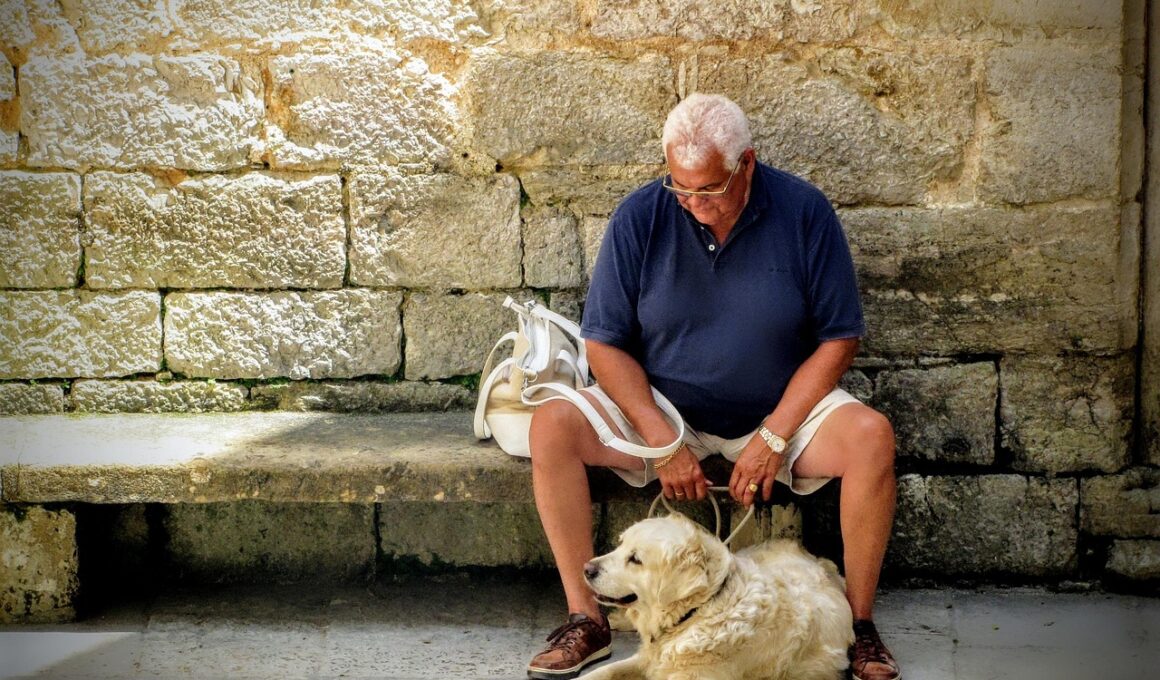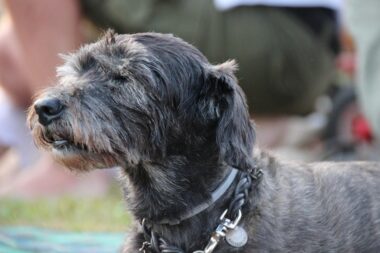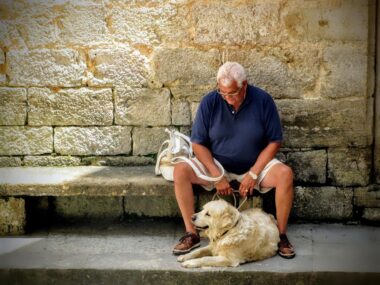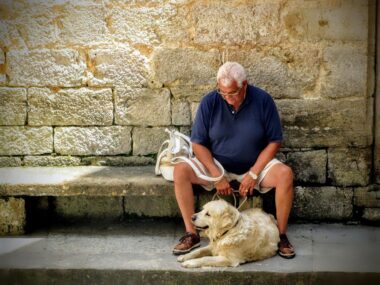Building Confidence in Older Dogs Through Social Interaction
Socializing older dogs can significantly enhance their confidence and mental well-being. As dogs age, they may become more apprehensive about new experiences. Engaging them in social activities with other dogs or people can help alleviate these fears. A well-socialized older dog is likely to exhibit less anxiety and a more positive demeanor. It’s essential first to assess the dog’s past experiences with social interactions, as this can greatly influence their current behaviors and response. Owners should strive to create a gradual introduction to social environments, allowing the dog to acclimate at their own pace. This approach helps foster a sense of safety and reassurance. Positive reinforcement strategies, like treats and praise, can motivate older dogs to interact more comfortably with others. Regularly scheduled meet-ups with friendly dogs can also provide a controlled setting to facilitate socialization. As the dog grows more comfortable, owners can increase the complexity of these interactions. Moreover, involving dogs in training classes designed for older pets can promote essential skills in a structured environment. Ultimately, socialization isn’t just about making new friends; it’s a vital aspect of enhancing the quality of life for older dogs.
A key element in building confidence is understanding the dog’s body language. Older dogs may signal discomfort through specific physical cues, such as backing away, whining, or avoiding eye contact. Recognizing these signs can help owners step in and reassure their pets, allowing them to feel safer in social settings. Additionally, engaging in low-pressure activities like leash walks in quiet parks can provide valuable exposure to various stimuli without overwhelming the dog. Social interaction does not always have to involve other dogs; meeting new people and various environments can also play a crucial role. Familiarizing the dog with different surroundings can ease the transition into social situations. Gradually introducing them to new experiences builds positive associations, signaling that the world is a safe place to explore. Owners should take note that some older dogs may need more time and patience compared to younger dogs. Maintaining a consistent routine is beneficial as it provides comfort and predictability to their environment. Frequent short and positive outings help dogs build their social skills gradually, leading to increased confidence over time. Engaging older dogs in fun activities allows them to thrive socially as they approach new experiences.
Utilizing Positive Reinforcement Strategies
Employing positive reinforcement can substantially impact an older dog’s socialization process. This method involves rewarding desired behaviors with treats, verbal praise, or affection. When older dogs receive positive experiences during social interactions, they begin to associate these situations with comfort and happiness. This approach should start slowly, with limited distractions, gradually building to more social scenarios. Even the most confident of dogs can be hesitant in new settings; thus, it’s vital to ensure gradual exposure. For instance, introducing older dogs to well-mannered companions and controlled environments can significantly boost their confidence levels. Owners need to remain calm and positive as their older dogs navigate new interactions. It is also beneficial to end each socialization session on a high note, rewarding the dog after a positive experience. Consistency in applying positive reinforcement encourages the dog to repeat the behaviors that yield such rewards. Utilizing fun toys and introducing engaging activities like fetch with other dogs can also turn socialization into a rewarding game. Owners should monitor their dog’s progress and adjust their approach as needed, celebrating every small victory in the dog’s confidence-building journey through socialization.
Taking the time to create engaging social environments for older dogs can lead to wonderful outcomes. This could be as simple as inviting friends over with their well-behaved pets or arranging playdates already familiar to the dog. Being mindful that older dogs might tire more quickly than their younger peers is crucial and should influence the duration of interactions. Short, positive engagements are more effective than prolonged sessions that can lead to overstimulation. Furthermore, owners should strive to monitor their dog closely for signs of stress or discomfort, allowing ample breaks and ensuring their dog remains hydrating. As dogs experience new friends and enjoy more positive social interactions, their confidence can flourish. Engaging older dogs in groups designed explicitly for their age can provide additional benefits, including tailored training exercises and social anchors. Being among their peers in a safe and structured setting helps older dogs feel comfortable and confident. These groups also allow for owners to share experiences with others facing similar challenges, fostering community connections. Gradually increasing outings to busy places can also help older dogs adapt better to various environments, encouraging a joyful exploration of life as they age.
The Importance of Mental Stimulation
Mental stimulation is another vital aspect of socialization for older dogs. Engaging activities keep their minds active and can help reinforce newly learned social skills. Taking part in puzzle games, scent tracking, or gentle agility courses can provide excellent outlets for mental engagement. Combining these mental exercises with social activities broadens the older dog’s experience, making it both enriching and stimulating. Additionally, participating in dog sports designed for older dogs can also be beneficial. These activities can build both physical and mental strength while promoting teamwork and social skills. Engaging socially with other dogs during these activities further enhances the benefits of interaction. Keeping the sessions fun and varied ensures that older dogs remain excited about learning and interacting. Owners should remain patient while encouraging their dogs, allowing them to progress at their own pace. By creating a comfortable learning environment, older dogs can develop confidence while exploring new ways to socialize. Engaging their senses keeps older dogs enthusiastic about their social activities, working collaboratively with both humans and other dogs, fostering a well-rounded experience.
Over time, consistent efforts in socializing older dogs yield results that manifest in their overall behavior. Pet owners should document any changes they observe, noting improvements in their dogs’ reactions to novel situations. This reflection serves as motivation for the owner, as well as a roadmap for progression. Sharing successes within a community of fellow dog owners can provide additional encouragement and support. Consider joining local pet clubs or online forums where members share their experiences and tips for socialization. Building connections with others who face similar challenges can lead to valuable insights and fresh ideas. Additionally, regular participation in dog-friendly community events provides older dogs with opportunities for safe interactions within larger groups. Owners should also explore therapy dog programs designed for older pets, allowing them to socialize while giving back to the community. These programs often provide structured environments tailored specifically for socializing needs, promoting growth and confidence. Regardless of the route taken, socialization remains an ongoing journey for older dogs that requires consistent attention, patience, and creativity. Engaging in these efforts ultimately leads to happier, more socially balanced dogs, contributing to their overall well-being.
Conclusion
In conclusion, socializing older dogs requires thoughtful approaches that prioritize their comfort and well-being. By incorporating various methods such as gradual introductions, positive reinforcement, and mental stimulation, pet owners can significantly improve their older dogs’ confidence levels. This transformation enhances not only their social skills but also their quality of life. Dogs thrive on routine and familiarity, so maintaining consistency in socialization efforts is essential. Additionally, celebrating small milestones will motivate both the owner and the dog throughout this process. Effective communication with one’s dog helps to create trust and understanding, fostering a healthy bond between owner and pet. As older dogs navigate social environments, pet owners should actively observe their reactions, adjusting their approaches as needed. Providing various engagement opportunities ensures their older dogs remain fulfilled and mentally stimulated. Every social interaction contributes to their overall development, enabling them to embrace their golden years with joy and confidence. Ultimately, dedicated owners play an essential role in fostering an enriching social experience for their older dogs. This commitment leads to happier, healthier canines who can enjoy social interactions for years to come.
As a final note, consistent socialization efforts for older dogs ensure a shared joy-filled life. Building a confident older dog enhances overall family dynamics, enriching everyone’s experiences. Stronger bonds may form, ultimately leading to happier households. By approaching socialization with understanding and patience, pet owners play a crucial role in promoting their dogs’ well-being and enjoyment of life. Everyday interactions become opportunities for growth, fostering a well-adjusted and happy companion. There’s no doubt that investing time and energy into socializing older dogs yields tremendous rewards, marked by tail wags and positive experiences.





